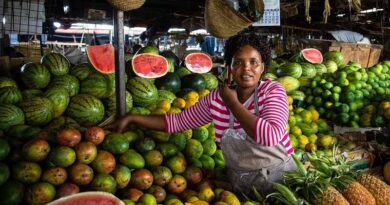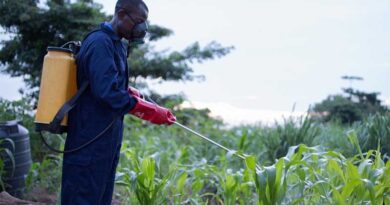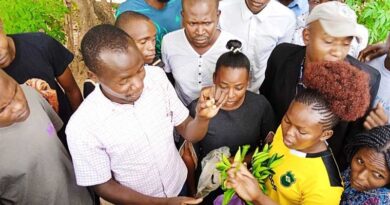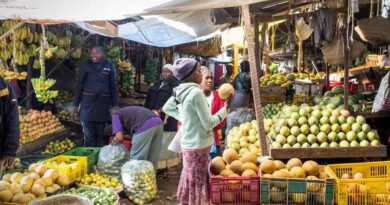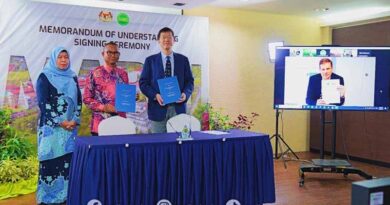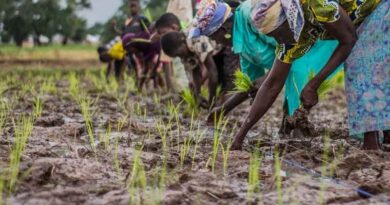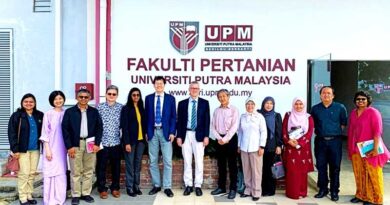CABI trains young service providers to help smallholder mango farmers in Kenya produce quality goods for export
10 October 2023, Kenya: CABI, under the PlantwisePlus programme, has trained more young service providers who will share their lessons learnt to help smallholder mango farmers in Kenya produce better quality goods for more profitable export markets.
The Training of Youth Service Providers project, contracted by Keitt Exporters Limited through a partnership that also include the Micro Enterprises Support Programme Trust (MESPT), helped tackle a range of challenges to mango farming such as how to tackle the threat posed by fruit flies.
Also taking part in the training were National Training of Trainers from the Kenya Agricultural and Livestock Research Organization (KALRO) and Ministry of Agriculture, Livestock, Fisheries and Co-operatives (MoALFC), Maxie and Max Africa, the Pest Control Products Board (PCPB), aak-GROW and the Government of Makueni County.
Third most important export fruit
Kenya is the 15th largest mango producer in the world with the fruit being its third most important export fruit after avocado and banana. In the seven months to July 2021, Kenya’s mango exports hit 3.05 million kilogrammes, worth KSh493 million.
However, according to KALRO, farmers often lose between 40-45% of their crop – primarily due to poor harvesting and post-harvest handling techniques as well as pests and diseases.
Kenya has since 2013 placed a self-imposed ban on the export of mangoes to the EU due to the fruit fly menace but the resumption of mangoes to Europe started during the November to March 2022 season.
Up to that point, the country was exporting only to the United Arab Emirates where prices are relatively lower than what the EU countries offer. The demand for quality is also less strict in Dubai than the EU.
Challenges of mango farming
Some of the other challenges of mango farming in Makueni country include farmers’ inability to take good care of their mango trees throughout the season and inadequate knowledge among farmers on recommended Good Agricultural Practices for the mango value chain and nursery certification.
Linda Likoko, Projects Support Officer at CABI, said the service providers trained were previously only employed as pickers, pruners, sorters, and graders of mangos. But the training provided by CABI has given them the chance to earn extra income in advisory and spray service provision.
“They will not only serve the farmers under Keitt Exporters Limited, but their services can also be offered to other mango farmers within Makueni County,” she said.
Modules taught included how to recognise microbial pathogens (fungus, bacteria, virus, water mould etc) with an emphasis on diagnosing pests and diseases in fruits – especially mangoes and citrus – as well as other horticultural crops.
Participants were also taken through various presentations, group activities and plenary discussions on the various common groups of insect pest. This included how to recognise them by looking at their general appearance and highlighting the symptoms they cause in plants.
Closing the glaring agricultural extension gap
The freshly trained team joins a set of 31 vibrant young service providers previously trained under the Plantwise Plus programme in May 2023 and attached to the Makueni County Fruit Processors Cooperative (MCFPC) to offer a unique set of quality skills to support the agricultural extension services within Makueni County.
Ms Likoko added, “It is very fulfilling to see the trained youth taking up the challenge to close the glaring agricultural extension gap by providing advisory and other agricultural services at various nodes of the value chains.
“The farmers are learning to trust them, thanks to the social capital of partner organizations on the ground.
“Going forward, we will work with like-minded partners to ensure that these young service providers champion the message on the production of safe, high-quality food as lead farmers, mentors and trainers, and subsequently, earn a living from it.”
Further capacity enhancement
Through a partnership between the MCFPC and International Centre of Insect Physiology and Ecology (ICIPE), the previously trained young service providers have received further capacity enhancement in management of fruit flies in mango farming.
This will further increase their offering to farmers on pest management. They are also actively engaged in farmer field days across the county to enable them link with farmers. CABI envisions partnering with ICIPE to provide similar training on fruit flies management to the recently trained 32 service providers.
Deogratius Magero, Youth Engagement Manager at CABI, said, “’The youth trainings offered by CABI and partners in agricultural service provision has significantly supported farmer’s adoption of safe pest management practices, consequently contributing to safer high-quality yields.
“We have also seen a one of the trained youths proceed to establish an agro-dealer shop to facilitate farmer access to inputs.”
Also Read: Brazil senate excludes ag from carbon market bill
(For Latest Agriculture News & Updates, follow Krishak Jagat on Google News)


